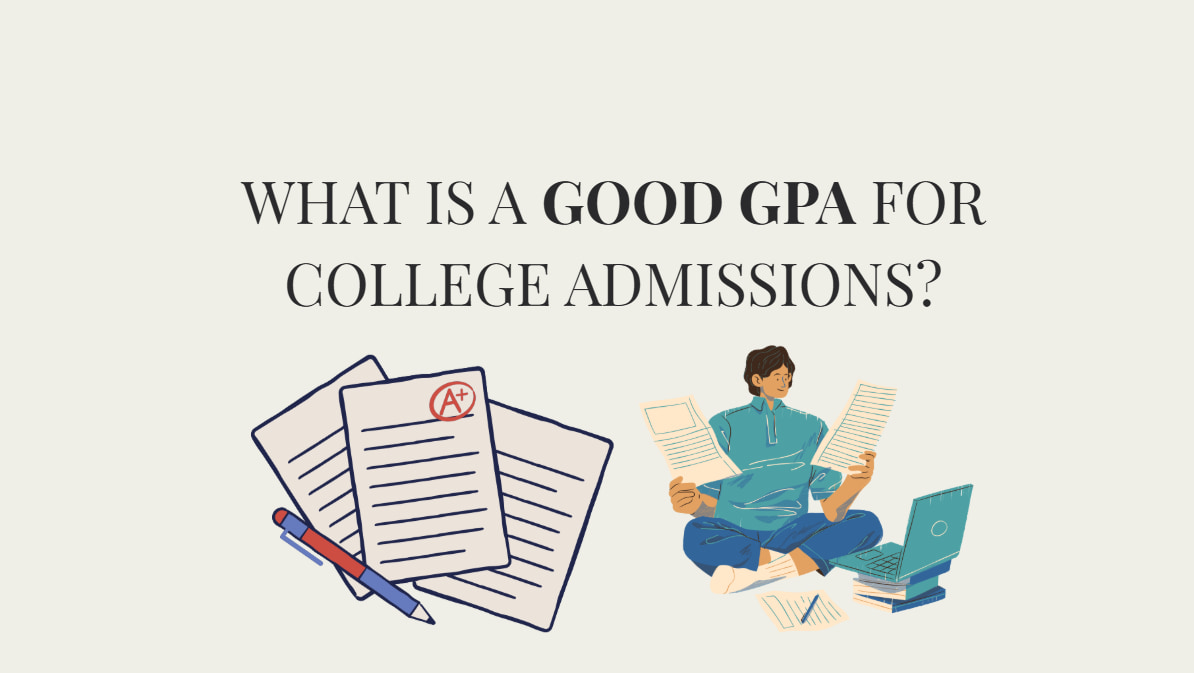I think knowing what GPA is good for college can take a lot of pressure off. Each school has its own standards, so what counts as “good” really depends on where you want to apply.
Sure, top universities might want something close to a 4.0, but plenty of great schools are happy with a 3.0–3.5 if the rest of your application is strong. However, there are many factors to consider in this matter.
What Is a GPA and Why Is It So Important?
Simply put, your GPA (or Grade Point Average) is a number that summarizes your overall academic performance throughout high school. It’s calculated by averaging the grades you’ve earned in all your classes, typically on a 4.0 scale where an A equals 4.0 points, a B equals 3.0, and so on. Some schools also use a weighted GPA system that gives extra points for challenging courses like AP or IB classes.
Why is it so important? One of the first things admissions officers look at is your GPA to get a sense of how well you do in school. A good GPA shows that you are serious, dependable, and ready for the college level. These points are also often used to compare you to other candidates from different schools.
But GPA isn’t the only thing that matters. Many colleges look for well-rounded students, so even if your GPA isn’t perfect, you can still stand out with excellent test scores, well-written essays, or extracurricular activities.

What Are the Types of GPA and How Are They Calculated?
I’ve seen many students and parents who don’t understand the different types of GPAs and how schools calculate them. Let’s break this down.
Unweighted GPA
An unweighted GPA is the most common type, and honestly, it’s pretty straightforward. It’s measured on the usual 0–4.0 scale, where an A is worth 4.0 points, a B is 3.0, a C is 2.0, and so on. The catch? It doesn’t take into account how tough your classes are. So, an A in regular math is worth the same as an A in AP Calculus, which doesn’t always seem fair.
From what I’ve seen, this can make students who take harder courses look like they have lower GPAs compared to those who stick with easier options. That’s why colleges often consider what kind of classes you’ve taken.
Ivy League institutions typically admit students with near-perfect unweighted GPAs (around 3.9–4.0). For global universities, admissions are generally based on country-specific criteria. Oxford, for example, expects about a 3.7+ unweighted GPA from US applicants.
Weighted GPA
A weighted GPA is a bit more flexible because it gives you bonus points for challenging yourself with classes like AP, IB, or honors. For example, an A in an AP class could count as 5.0 instead of 4.0, and a B could count as 4.0 instead of 3.0.
Weighted GPAs often make students look stronger on paper, but the flip side is that advanced classes can be harder to ace. You still have to perform well to make that extra weight work in your favor.
Public universities like UCLA and UC Berkeley report fully weighted GPAs of admits well above 4.0, while the median unweighted GPAs remain around 3.9–4.0.
Cumulative GPA
Your cumulative GPA is simply the average of all your grades across high school. Colleges like this number because it shows how consistent you’ve been over time. One bad semester won’t sink your chances if they see improvement later on.
In my opinion, steady progress (or a clear upward trend) can sometimes impress admissions officers more than a perfect GPA from day one.
How to Calculate Your GPA?
While every school has its own method, the process is usually pretty simple:
- Convert each class grade into points based on the grading scale (e.g., A = 4.0, B = 3.0).
- Multiply the grade points by the number of credit hours for that class (if your school uses credit hours).
- Add all the total grade points from your classes.
- Divide by the total number of credits you attempted.
For instance, if you have four classes with grades A, B, A, and C, the points would be 4.0 + 3.0 + 4.0 + 2.0 = 13. Then, divide by four classes to get a GPA of 3.25.
What Is a Good GPA in High School for College?
In my experience, it largely depends on the schools you’re targeting. A “good” GPA isn’t the same for everyone.
For highly competitive universities, such as Ivy League schools, a GPA of 3.7 or higher is often expected. In contrast, less selective colleges may be satisfied with a GPA between 3.0 and 3.5.
Keep in mind that GPA is a quick way for admissions officers to see how well you’ve handled difficulties in school and if you’re ready for the college level.
I always tell my students to try to get a GPA that puts them in the top 25% of students who get into their dream schools. Why? It shows that you’re not just meeting the requirements; you’re standing out. When you’re trying to get merit scholarships or a spot in a competitive program, that extra push can make all the difference.
However, it’s not the end of the world if your GPA isn’t excellent. Admissions teams also consider the difficulty of your courses.
For example, a GPA of 3.5 with AP, IB, or honors subjects sometimes appears better than a 4.0 from easy classes. So, push yourself when you can. It shows that you’ve grown, are determined, and can handle hard work.
GPA Statistics for Different Colleges and Universities
From my experience as a college admission consultant, knowing the average GPA of admitted students can help you make smart decisions about your own goals. Here’s what actual statistics and average GPA points look like for top institutions.
| College/University | Average High School GPA (Weighted) | Typical GPA Expectation |
| Harvard University (Class of 2025) | ~4.18 | 3.9–4.0+ |
| Princeton University | ~3.91 | 3.9–4.0 |
| Ivy League Average (six schools) | ~3.90–3.94 | 3.9+ |
| Stanford University | ~3.94 | 3.9+ |
| University of Chicago | ~4.32 | 4.0+ (weighted) |
| University of Georgia | ~4.14 | 4.0+ |
| State & Regional Universities (average range) | 3.3 – 3.6 | 3.2–3.8 |
I also often get asked: does GPA vary by major? From what I’ve seen, the answer is a definite yes. Different fields have different grading norms, so understanding these trends will help you set realistic goals:
- STEM majors (engineering, math, computer science): tend to have lower average GPAs—often around 3.0. These courses are typically more rigorous, and grade inflation is lower.
- Business and economics: Around 3.3 to 3.5 GPA, depending on the school.
- Humanities, fine arts, social sciences: these academic fields usually report high GPA scores, often around 3.5 or higher.
A cumulative 3.3 GPA in STEM can be very competitive—even though it looks lower than average in other fields. Conversely, a strong weighted GPA in humanities or business majors might reach 3.75 or higher more easily, especially with AP or IB classes.
Can a Lower GPA Still Get You Into College?
Absolutely! From what I’ve seen, a low GPA doesn’t automatically mean your college dreams are over. Plenty of schools look at more than just grades. Even with a GPA of 3.0, you can still find great options if the rest of your application stands out.
Most colleges have some kind of minimum GPA, but this varies. A 3.0 GPA is considered solid for many state schools, while community colleges and some universities accept students with GPAs below that.
Once you’re in, your GPA in college is a fresh start—you can improve your grades and build a strong record as you work toward your bachelor’s or master’s degree.
If your grades aren’t where you want them to be, don’t panic and focus on the parts of your application you can control:
- A personal essay with a compelling story can outweigh a lower GPA, especially if you show growth or explain challenges you’ve overcome.
- Strong recommendation letters and good test scores (if required) can also help balance things out.
I always remind students that GPA can open doors, but it’s not the only way in. Schools want students who will succeed, not just those with perfect grades.
So, even with a GPA of 3.0, you still have a shot at plenty of great institutions. Just research the GPA requirements for admission in college or university you’re aiming for, and focus on building a well-rounded application.
What Is a Good College GPA for Graduate School?
Generally, a GPA of 3.0 or higher is considered the minimum for many graduate schools, but competitive programs often prefer options closer to 3.5 or above. For highly selective programs (like law schools, medicine, or top MBA programs), you’ll usually see applicants with GPAs in the 3.7+ range.
That said, it may not be the only thing that determines your chances. Graduate schools also weigh other factors such as test scores (GRE, GMAT, LSAT), research experience, internships, and letters of recommendation. Also, a strong personal statement and relevant work experience can help you stand out.
In my opinion, aiming for at least a 3.5 GPA in college gives you a strong foundation when applying to graduate school.
Final Thoughts
In my opinion, there’s no single “perfect” GPA. A 3.7 or above is usually considered a good GPA, but what matters most is how it fits the colleges you’re applying to. Your GPA may be a huge part of the tale, but your essays, activities, and recommendations may have just as much of an effect as your academics at any college.
In addition, if you’re planning ahead, keeping a good GPA in college can help with future opportunities like internships or graduate school. But remember that steady improvement and showing you can handle tough classes also matter.
And if you need some help, the best college admission consultants can guide you on how your GPA stacks up and how to improve the rest of your application.

